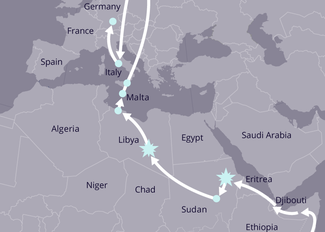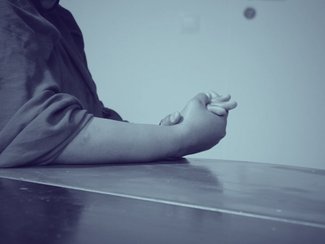Halima’s story
“I’d only heard from BBC that people died in the desert from starvation, but I didn’t expect peoples’ kidneys would be harvested…” says Halima, discussing her knowledge of the journey’s dangers. “I didn’t have enough information. If it had been enough I wouldn’t have taken the journey. But when you move you see the reality.”
Originally from Mogadishu, Halima has been through a great deal during her journey to Europe. And despite her eventual arrival there, the last seven years have seen her traveling between different countries seeking asylum without any success.
Halima originally had no intention of traveling to Europe. But her life changed when she was wounded in an explosion in Mogadishu during a cleaning campaign. She traveled to Djibouti to seek medical treatment, and when she arrived she was asked to pay an astronomical amount of money for the surgery she needed.
Unable to pay for her treatment, and in pain from having undergone a miscarriage while still wounded, Halima consulted with other Somalis on what alternatives were available. It was then that she learned she could go to Europe via Libya. Not knowing what to do and having no other options, Halima decided to follow a group of Somalis who were traveling to Sudan via Eritrea.
The first accident she witnessed was in Sudan where she saw several other refugees drown in the Nile. They had been traveling alongside her in a different boat. “There was an Eritrean family— a father, mother, and children—who all died,” she says. “All the problems started in Sudan. I came to Khartoum heartbroken.”
After crossing over to Libya, Halima encountered some of the worst atrocities possible. She was sold between smugglers and, despite her evident wounds, was subjected to severe torture resulting in her hospitalization.

“They took the guys one by one, and each one came back with blood on their nose,” Halima recalls. “Some were electrocuted and they came back crying. They beat me very badly, even though they could see I was already injured.”
After paying 1,000 USD to a smuggler, Halima was put on a boat together with 300 other people.
“We were good, there were no problems since we had a big boat,” she recalls.
When she arrived in Italy, Halima discovered that the Europe she had been dreaming of didn’t match the one she saw before her. After her fingerprints were taken she was housed in a shelter for a period of six months before being given a permit and released to fend for herself. Not knowing the language, Halima struggled. She decided to marry a Somali man, who she later learned was already married. She decided to get a divorce.
Unable to survive in Italy, and now heavily pregnant, Halima got assistance from other Somalis who funded her travels to Sweden where she sought asylum. While awaiting the decision she gave birth to her daughter from her ex-husband. Because of the Dublin Regulations Halima’s asylum application was swiftly rejected.
Afraid that she would get sent back to Italy, Halima fled to Norway where, at first, she was welcomed and provided with shelter.
“I was having a good time in Norway,” Halima says. “They offered me a house. But you are like a cow owned by someone else, and in Europe they share one computer,” she says, referring to one’s data being made available everywhere. “They made the decision to return me to Italy. They lied to me, saying that Sweden had asked I return to where my daughter was born.”
After being sent back to Italy from Norway, Halima struggled again to get food and shelter for her daughter. She decided to seek help from a church and look for a job. Finally, she decided to try her luck in Germany.
“I have been here for seven years, getting thrown out of different countries,” Halima says. “You learn how it feels to be a foreigner in another country. I did not expect this experience. I didn’t expect to get deported to another European country.”
At the time of this interview, Halima was still awaiting an asylum decision from the German immigration authorities which would determine whether she’d be allowed to stay.
“I’ve been here for seven years and I haven’t accomplished anything,” Halima says. “I can’t support my children or my parents.”
Despite a bleak looking future, she is still hopeful.
“I am hoping to get out of this,” Halima says. “Germany is the fourth country that’s taken my fingerprints, and it was not my intention.”

